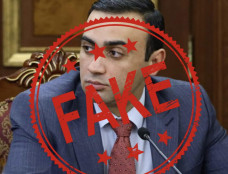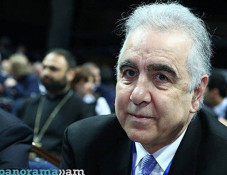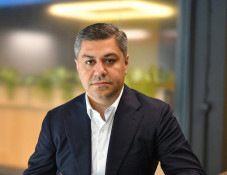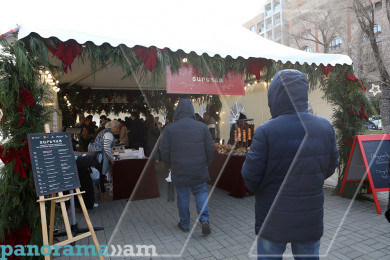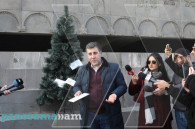
Chris Bohjalian: With our victory in Karabakh we said ‘Never again to ethnic cleansing and genocide’
“Artsakh is about our unwillingness to be annihilated… Karabakh war was our line in the sand against ethnic cleansing and genocide. The Armenians all over the world must join efforts to build stronger and more democratic Armenia and NKR”, – said New York Times best selling writer, author of famous novel The Sandcastle Girls in the interview with Nvard Chalikyan.
Below is the first part of the interview.
-Mr. Bohjalian, as a writer you know the power of a story. I believe we as representatives of the Armenian nation have a unique story of survival and resurrection. How would you describe the role of Nagorno Karabakh /Artsakh, which you have recently visited, and our gains there in the framework of the story of the Armenian nation?
- We have a unique story to tell indeed. In many ways I view the Karabakh war as our line in the sand against ethnic cleansing and genocide. When I visited Karabakh and the liberated territories and spoke to many people who were on the front lines, I came away with the sense that Artsakh was about our unwillingness to be annihilated, it was our saying, “No, 1915 will not happen again”. I was so impressed by the young people in the trenches because of their commitment – their commitment goes back to who we are as people. After the pogroms in Sumgait and Baku, after the discrimination that the Armenians experienced when Karabakh was an oblast in Azerbaijan, Artsakh was our reclaiming of our ancestral lands for us, especially in places like Karvachar which is the cradle of the Armenian Christianity. I was so filled with pride when I saw the Armenian churches and the Armenian medieval architecture in Dadivank. There are two frescoes on the wall from the 13th century that rival with the most beautiful frescos I’ve seen in Tuskany, Italy. It is a testimony of what we were accomplishing 800, 900 or 1000 years ago.
- How would you present Artsakh case to the foreigners?
- Artsakh is Armenian. The people there are not planning ever again to either be relocated of that part of our motherland or to live under Azeri rule. I have always felt there are parallels between Artsakh and the United States in terms of self-determination. But Artsakh is more than that. As the Ombudsman of Artsakh Ruben Melikyan told me, the case of Artsakh is about the people’s right to self-determination on their own land and about their right to live without fear of extermination. The fact is Azerbaijan has demonstrated that it is unfit to govern the Armenians. Aliyev gave a medal to an axe-murderer. Aliyev keeps threatening to shoot down the airplanes if they fly from Stepanakert, and recently in April it launched an unprovoked surprised attack all across the line of contact. Azerbaijan is the kind of state that shells schools! I spent a day in Talish village which was severely damaged as a result of the April war. The case of Artsakh is thus about human rights and about the survival of a nation.
- Having studied and written about the tragic pages of Armenian history, what is your message as a writer, as a Diaspora Armenian and as a human being to the Armenians now living in the homeland?
- I would say we have won the war in Karabakh, now we need to win the peace. Armenia has won its independence; now it needs to win the democracy. Nation building is hard. Republic of Armenia and the Republic of Artsakh are infants in geological time. We are an ancient nation but we are only 25 years old as independent states. When I think of the United States, 25 years after we declared independence we were not a world power, we were the Eastern part of North America surrounded by the Spanish, French and British territories – it would be only 11 years later that we would have the war of 1812 where Britain would try to reclaim the United States, and the White House would be set on fire. So Armenia is still struggling to build a free market economy, is still struggling to have a viable democracy, but there is still time to figure it all out.
It is especially hard for Armenia, because we are coping with the leaders who came with Soviet mentality, who don’t understand that the people’s will comes first and that free market economy means trying to create businesses that allow everyone to thrive; we are surrounded by countries that wish we did not exist and have closed the borders; in some parts of the country we are still reeling from the consequences of the natural disaster back in 1988 – that is a trifecta of trouble! So the first thing I would say is be patient and never give up, but also as human beings walking on the streets of Tumanyan and Abovyan keep standing up for your rights and don’t be silenced by the guns and firehoses… because nation-building is hard.
And to the people of Karabakh, who have dirt roads running from Stepanakert through the liberated territories to the South and who are struggling for recognition, I would say – remember, you are still a baby state, you are the pioneers; you have made the decision that you are going to be independent from Azerbaijan and to build your state; pretend it is the United States in 1801. It is hard but you’ll get there. Republic of Armenia together with Artsakh are pioneers, with all the struggles peculiar to a pioneering country.
- We spend a lot of resources on international recognition of the Genocide, having an ultimate goal of achieving justice, reparations and ensuring the security and prosperity of the Armenian nation on its homeland in the long-run. Don’t you think we would be able to better achieve these goals if the Diaspora mobilized most of its resources on building a stronger Republic of Armenia and Artsakh?
- That is absolutely right. Armenians in the Diaspora (in North America in particular) are more focused on Genocide recognition than the Armenians in the homeland. I would say it is important for us to have one foot in 1915 and another foot in 2016, especially given the issues with the current government and how stretched the resources are. The Diaspora Armenians must have Karabakh’s back, in the same way that we need to have Republic of Armenia’s back. The Armenians in Diaspora have resources that the Armenians here do not have; we have a moral obligation to help build this nation – this is very important. There are different tasks in RA and NKR. We need to help the Republic of Armenia in terms of building democracy and building economy; we need to help build the rural community so that the men don’t go to Moscow to work and the families aren’t pulled apart by economic disaster. The more we can do to make the rural village economically viable the better. In Artsakh we need to help build security and also build infrastructure outside Stepanakert so that tourism could flourish.
- Is there something unique about Armenians as a nation or people?
- I hate to generalize, but I think all of us to a certain degree carry inside us the whispers of the 1.5 million. I think that makes all of us very resilient (we are the survivors) and resiliency is a great thing. Also, when we laugh we laugh really loud and when we cry it is without shame and when we live, we live large.
To be continued…
Interview by Nvard Chalikyan
……….
Chris Bohjalian is the author of 19 books, most of which were New York Times bestsellers. His work has been translated into over 30 languages and three times become movies. He has received ANCA Arts and Letters Award for The Sandcastle Girls, as well as the Saint Mesrob Mashdots Medal.
Newsfeed
Videos










